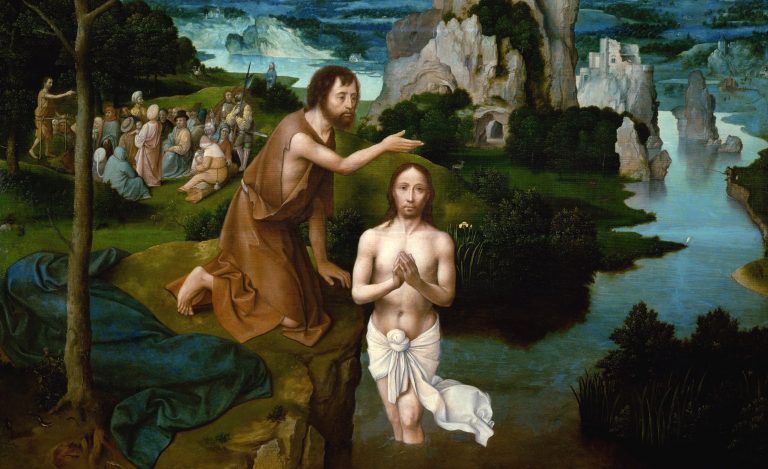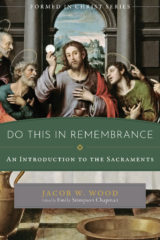By Jacob Wood
Dr. Jacob W. Wood is Assistant Professor of Theology at the Franciscan University of Steubenville. He has presented at conferences nationally and internationally. He is the author of Do This in Remembrance: An Introduction to the Sacraments.

All throughout the day we are surrounded by words. We talk with friends at school, we write text messages to friends elsewhere, we listen to the radio in the car, we watch television at home, we read books at night. Words help us share our thoughts, feelings, and desires with others; they help us understand the thoughts, feelings, and desires of others as well. Scientists estimate that the average person speaks about ten to fifteen thousand words per day. That’s enough to fill fifty books per year!
Without words, we would be altogether isolated from others. In fact, we would even be isolated from ourselves. Our very thoughts require words. Sure, we can picture things in our minds without words, like trees, but the moment that we want to think about what we see in our mind’s eye we have to form an idea, which is a collection of words: “This is a tree.”
The purpose of a word is to point to something. When we think, our ideas point us to the things we are thinking about. When we speak, our spoken words point others to our ideas. When we write, our written words point others to what we would have said if we were present with them. In this way, our whole relationship to the world, to other people, and to ourselves is characterized by words.
Because God made us, he knows how much we depend on words (CCC 1146); and so, since he wanted to enter into a relationship with us, he decided to use words at every step of the way. In the beginning, God created all that exists with the words “Let there be” (Gen 1:3). When God wanted to draw the people of Israel into a relationship with himself, he gave them the Decalogue, which is another way of saying “Ten Words” (Exod 20). Finally, when the fullness of time had come, God sent his own Word, Jesus, to live, die, and rise again among us. We call Jesus the “Word of God” (John 1:1) because he does for God what words do for us: he shows us who God is and what God has in mind for us.
There’s a big difference, though, between our words and God’s words. Our words indicate our thoughts, but our thoughts don’t make anything happen. We can think for hours about doing our homework, but if we don’t act on our words, the homework never gets done. On a more serious level, we can have important conversations about how we would like to solve world hunger, but if we don’t go down to a soup kitchen, nobody actually gets fed. Since our words don’t make things happen, we can even say one thing and do another: we can lie, cheat, and deceive. In technical language, we say that our words are signs (they point to things), but they are not causes (they don’t make things happen).
It’s not the same with God. God can never lie, cheat, or deceive because there is no gap between his words and his actions. All God has to do is talk about doing homework and it gets done, because everything that God says, happens. God’s words are both signs and causes; and since Jesus is God, Jesus’ words are signs and causes too. When Jesus said to the storm, “Be still!” (Mark 4:39), his words made the storm stop. When he said to the paralytic, “Rise, take up your bed and go home” (Matt 9:6; Mark 2:11; Luke 5:24), his words made the man’s legs better. When Jesus said to Lazarus who had been dead for four days, “Laz’arus, come out” (John 11:43), his words made Lazarus get up and walk out of the tomb.
Importantly, Jesus did not keep the power to speak God’s words to himself. St. Paul tells us this when he writes that Jesus never thought of his equality with God as something to be kept to himself (Phil 2:6). On the contrary, he gave the Catholic Church the power to use his words in seven ways. Those seven ways are the seven sacraments: Baptism, Confirmation, Eucharist, Penance and Reconciliation, Anointing of the Sick, Holy Orders, and Marriage. In each of the seven sacraments, a minister of the Church speaks the words of Jesus and does something. Since the minister’s actions are empowered by Jesus’ words, things happen—just like on the day of creation and on the day when Jesus raised Lazarus from the dead.
Learn more in Do This in Remembrance, part of the Formed in Christ series.
The Formed in Christ series is a solid and faithful resource that provides a thorough treatment of the Catholic faith and various branches of theology. Whether you're an armchair theologian wanting to fill in the gaps of your religious education or an educator who wants to implement a rigorous and orthodox curriculum, you'll find your answer in the Formed in Christ series.
You Might Also Like

The Formed in Christ series is a solid and faithful resource that provides a thorough treatment of the Catholic faith and the various branches of theology. In Do This in Remembrance: An Introduction to the Sacraments, Dr. Jacob W. Wood shows how Christ gives his Church the power to speak with God’s voice in the seven sacraments. In this foundational guide to the sacraments, discover the power of the signs and words that transform us by grace and prepare us for glory.

